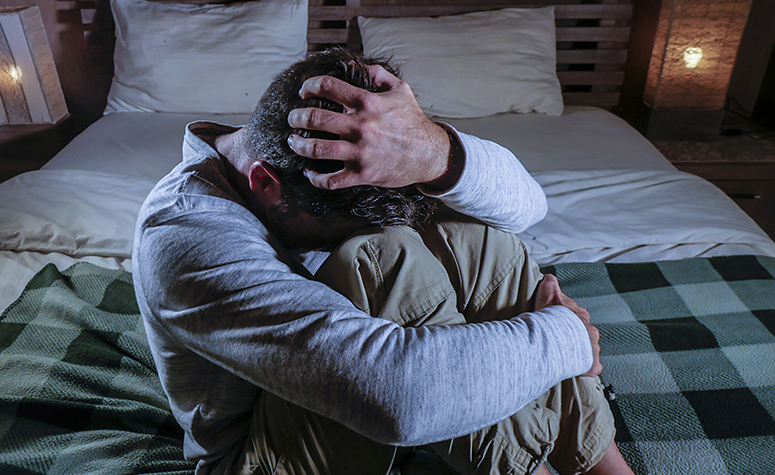Alcohol Withdrawal:
Symptoms, Timeline and Treatment
Throughout your early recovery period, the first extremely difficult obstacle to tackle is alcohol withdrawal. In this article, we will explain what it entails, what the most common (and also most severe) symptoms are, and what steps to take to overcome this challenging process of recuperation.
Alcohol Withdrawal: A Brief Definition and Analysis
When you abruptly stop drinking after a continuous period of frequent substance intake, you go through an uncomfortable process called the alcohol withdrawal syndrome or AWS. Due to the frequency of alcohol entering your system, your body develops a tolerance to its presence. Therefore, its sudden absence will trigger a reaction.
Alcohol can change an individual’s internal makeup, causing actual physical changes that result in addictive behaviour. Because of these changes, reducing the intake is not easy.
Some of the most common signs and symptoms that heavy drinkers may experience during withdrawals are outlined in this article. In addition, we will focus on the many ways alcohol interacts with your body, specifically during the time frame when you’re trying to abandon the practice and recover. By knowing the specific AWS-related symptoms, you can apply the most effective solution to tackling them.

What are the Symptoms of Alcohol Withdrawal?
AWS symptoms will vary from person to person. The severity and intensity of the symptoms will depend on a multitude of different factors, including:
- The frequency of alcohol intake (for instance,
how often you drink throughout the week) - The amount of alcohol consumed
- Physical health of the inpatient
- Mental health of the inpatient
Aside from alcohol withdrawal symptoms, there are also symptoms related to alcohol use disorder that medical experts handling your treatment ought to take into consideration. Regarding the AWS symptoms themselves, they can range from mild to severe, both physical and psychological.

Common symptoms
- Nausea and vomiting
- Headaches
- Abdominal pain
- Irregular/increased heart rate
- Excessive sweating
- Shaking/shivering
- Fatigue
- High temperature and/or chills
- Unpleasant, often vivid dreams
- Tics
- Tremors (‘the shakes’)
- Decreased appetite
- Mood swings
- Confusion
- Irritability/agitation
- Difficulty concentrating
- Depression
- Anxiety
- Insomnia
- Intense cravings for alcohol
Severe symptoms
Broadly speaking, as the most recent data illustrates, only 3‒5% of the people who suffer from AWS will exhibit severe symptoms. The most severe symptom of withdrawal is called delirium tremens (DT). If not handled properly at a professional healthcare facility, DT can be potentially life-threatening for the afflicted individual. In fact, if you notice that someone is suffering from delirium tremens, consider it a medical emergency and call an ambulance immediately.
Despite being rare when compared to mild symptoms of alcohol withdrawal, delirium tremens is fairly easily recognisable. All you have to do is observe an individual for these specific symptoms:
- Severe disorientation
- Confusion
- Extreme agitation
- Visual hallucinations
- Auditory hallucinations
- Seizures
- Fever
Not every person will experience withdrawal the same. Some individuals will display certain symptoms but not others. Therefore, it is extremely important that you remain vigilant and call the medical experts the second you have a suspicion of something serious regarding either you or your loved ones.

How Long do Withdrawal Symptoms Last?
As stated earlier, depending on a variety of factors, AWS can manifest differently with each unique case.
Typically, the early symptoms occur within the first few hours of your last alcohol intake. Overall, the most critical period would be within the first 48 hours. At this point, the inpatient experiences mild symptoms, and they gradually become worse as more time passes. Headaches and hand tremors are the most common, most expected symptoms, as is craving for alcohol.
The process of alcohol withdrawal will vary in length, depending on the individual’s history of alcohol addiction. Usually, it can last anywhere from three to seven days since the last alcohol intake.

Fast Access to Residential Treatment
We are currently able to offer fast access to private inpatient treatment.
Please call us today and speak to one of our expert advisors.
Call today in confidence: 0800 0148 970
Getting the Necessary Help for Alcohol Withdrawal
Individuals who drink often tend not to notice early symptoms and usually continue with their addictive behaviour until said indicators become more severe. With that in mind, you should consult a healthcare professional the minute you spot any of the common but mild indicators like hand tremors and alcohol cravings. Luckily, there are various methods of handling this issue at an early stage, and we will cover the most effective ones in the following paragraphs.
The first vital step is getting an addiction assessment. This is done by contacting a reputable organisation that has a history of treating alcohol dependency and other substance abuse issues.
When you contact a treatment facility, the experts will discuss the issue with you and assess the level of severity based on multiple factors. High-end professionals will have constructive dialogue with you about the nature of your engagement with alcohol in full confidentiality. They will also offer a list of options for you to consider based on the type of addiction you exhibit.
Most often, addiction assessments are completely free of charge, and booking one will not require any excessive effort on your part. Furthermore, the experts understand what you’re going through, and they’re fully aware that your first steps will be difficult, which is why extra care is taken when assessing the situation during those early stages.
What follows are several effective methods of handling AWS and reducing the severity of the symptoms.

Though no one can go back and make a
brand-new start, anyone can start from
now and make a brand-new ending
Detoxification
In the case of long-lasting, severe, and complicated alcohol withdrawal symptoms, relief will require a prescribed dose of suitable medication. This procedure is called alcohol detoxification, or detox.
For sufferers with a high level of urgency, detox is performed as an inpatient procedure. This process involves placing the inpatient in the appropriate facility, with constant monitoring, proper medication intake, and additional care by expert healthcare professionals. The prescribed medication will vary depending on the severity of your situation, though most commonly, the treatment will include diazepam and chlordiazepoxide.
Detox is highly important, but it merely comprises the first step of the recovery process. Once the patient has stabilised, they will spend additional time at the facility for other forms of inpatient care. Those will most likely involve support group therapy and additional types of physical or psychological treatment.

Appropriate therapy
Within alcohol addiction care, right after detox, a common form of treatment involves a method known as cognitive behavioural therapy or CBT. This step is highly important since it helps the individual pinpoint the underlying causes of their alcohol addiction and address them appropriately.
Despite detox being effective, inpatient care through CBT must continue. Otherwise, there is a risk of relapsing back into addictive behaviour. Unless the patient knows what causes or triggers their addictive impulses, they won’t be able to address them and begin the important process of recovery and corrective behaviour. Anything can act as a trigger, from past trauma to stressful life situations that could make you relapse once again.
One key element that makes therapy effective is the fact that patients develop coping mechanisms and strategies to keep their triggers in check and eventually even overcome them. It’s a form of treatment wherein the individual becomes more resilient than before and applies healthy, constructive practices to improve their physical and psychological well-being.
Therapies can consist of one-on-one discussions with a licensed therapist, but group sessions are also possible. Within that category, inpatients can either progress onward with their family or as part of a group with other inpatients, with the goal of mutual progress and growth.

Aftercare
Battling addiction is a lifelong process that doesn’t end with detox and therapy. In fact, individuals who go through rigorous treatments have to maintain their impulses, or else they risk relapsing.
There are several different methods of achieving this goal once inpatient therapy is done. One involves attending aftercare programs that consist of individuals with prior addiction experience, whether they are healthcare professionals or former addicts themselves. These support networks are a healthy, organic way of maintaining sobriety and keeping the impulses for drinking in check.
Another method that can assist you in maintaining your sober state is secondary care. It is similar to primary care (i.e. detox, therapy, aftercare), involving more specific treatments and healthcare employees of higher expertise levels. On rare occasions, depending on your level of relapse, you might require tertiary and even quaternary care. To put it simply, they are similar to secondary care but with far more specialised goals and an even higher level of experts at the helm.
Get the Right Treatment for Alcohol Withdrawal and Addiction Today
If you or your loved ones are showing symptoms of alcohol withdrawal, get in touch with us as, in complete confidence as soon as possible.
Our team of consultant psychologists, psychiatrists, therapists and other medical professionals will provide you with top-tier care through modern, effective methods of therapy.
In addition, we offer free addiction assessments, and you are under no obligation to undergo rehab even after the assessment is performed.
Remember, even minor symptoms can be a signal of dependency, so make sure to root it out early and live a healthy, addiction-free life.
Our highly trained advisers are available to speak to you right away, simply call 0808 252 3379 today.
Professional and compassionate help is just a phone call or click away.




